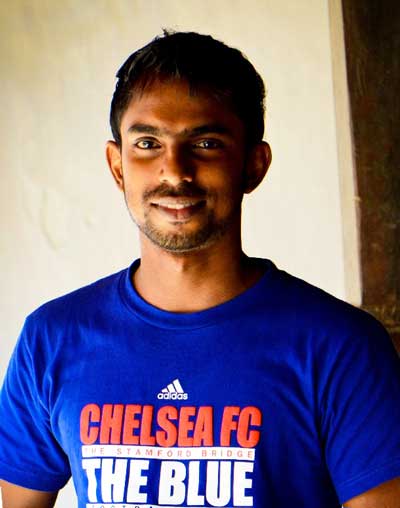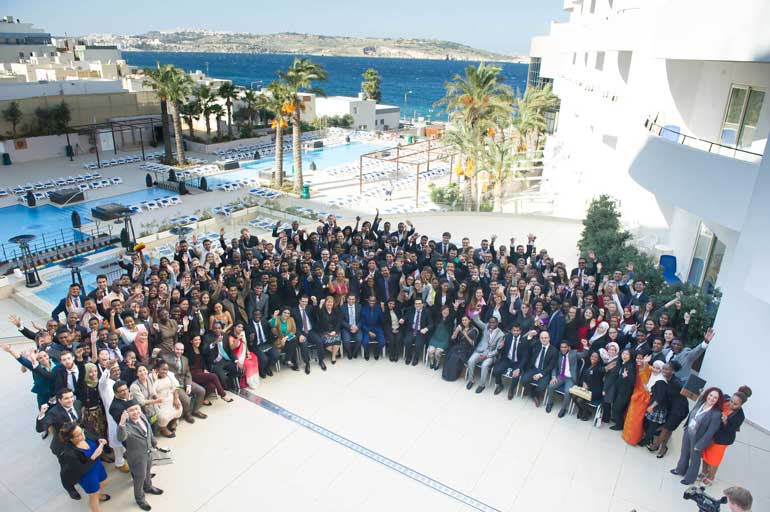Thursday Feb 12, 2026
Thursday Feb 12, 2026
Saturday, 28 November 2015 00:00 - - {{hitsCtrl.values.hits}}
 As I write this blog, 400 young persons from 53 Commonwealth countries are discussing the Action Plan for the next two years of the Commonwealth Youth Council (CYC) and deciding on who they want to elect for the Executive Committee that will oversee the implementation of the Action Plan.
As I write this blog, 400 young persons from 53 Commonwealth countries are discussing the Action Plan for the next two years of the Commonwealth Youth Council (CYC) and deciding on who they want to elect for the Executive Committee that will oversee the implementation of the Action Plan.
The past four days in Malta have been a hive of activity, from enlightening sessions on the four thematic areas of economy, environment, social and politics, to stimulating guest speeches and plenary discussions on climate change, sustainable development and gender equality.
The keynote address from the Prime Minister of Malta, Joseph Muscat, called on young people present at the opening ‘to be ambitious and come up with inspiring ideas, no matter how radical they might be’, while the Commonwealth Secretary-General Kamalesh Sharma called the forum ‘a new development process through which youth insight will promote tolerance and acceptance’.
For sheer numbers’ sake, 60% of the population of the Commonwealth is made up of people under the age of 30, which is approximately 1.2 billion young people. Commonwealth countries represent one-fourth of the membership of the United Nations (UN) and contribute 47% of UN Peacekeepers (as of 2015). Therefore, as an inter-governmental organisation, the Commonwealth can bring together a community of countries with the energy and drive to develop fair, resilient and universally acceptable solutions to global problems. But are they?
Theme and process
The theme of this year’s commonwealth was on ‘Adding Global Value’ – which encourages Commonwealth governments, civil society and youth to think about what unites the Commonwealth and what it can achieve together. The 10th Commonwealth Youth Forum (CYF) continued along the same lines with the question ‘#WhatNext?’, looking at how young people can contribute and add value to upholding and enhancing the Commonwealth Charter, achieving the Sustainable Development Goals (SDGs), and meeting the outcomes of the Commonwealth’s Strategic Plan. This makes the CYF a crucial platform if the Commonwealth is to be revived and made more relevant on a global stage.
This year’s CYF covered three main areas: discussion of priorities for young people and the preparation of the Action Plan for the next two years; the convening of the second General Assembly (GA) of the CYC and the adoption of the Action Plan; and the election of the new CYC Executive Committee.
The development of the plans revolved around the economic, environmental, social and political agendas. Each thematic area had experts discussing various aspects of pre-defined topics such as disaster risk reduction, quality and inclusive education, role of young people in the SDGs,peace, reconciliation and socialcohesion, to name a few. Delegates were allowed to choose sessions that were relevant to their area of work and then energetically deliberated and proposed ideas and plans on what they would like the CYC to implement over the next two years.
The CYCGA session which replicates a similar setting to the UNGA covered two main areas: presentation of the outgoing Executive Committee’s report and the reporting back of the action plans drawn up over the previous three days and the adoption of these plans by the Assembly. The GA session was little short of being stormy, with delegates holding the outgoing committee accountable for their work over the past two years and demanding for greater clarity and transparency.
The final aspect of the CYF this year involved the election of the new Executive Committee. Throughout the past three days, delegates nominated from each of the regions were campaigning to be selected as Chair, Vice Chairs and Representatives of the five regions. This year’s Chair is to be selected from the Asian region.
Challenges
While the forum did present a unique opportunity and a platform for a large number of young people to discuss and have their voices heard, it also highlighted the challenges that exist in ‘letting young people decide what they think is best for their future’.
Firstly, the attempt at having a democratically elected CYC meant intensive campaigning by the candidates during the first three days of the forum. This meant their attention was solely focused on convincing fellow delegates that ‘they’ alone were the best to hold office, and their lack of participation in the thematic discussions and in developing the action plans which they, if elected to office, are responsible to implement – questions their intentions. It also begs the question as to how they would be accountable for a plan they were not a part of.
Secondly, the complete lack of understanding on the part of some of the delegates in relation to the processes vis-à-vis the Constitution of the CYC created deadlocks at the GA, resulting in long drawn out sessions into the night.
Thirdly, the whole question of accountability requires serious addressing. While young people eternally highlight the need for holding their respective governments accountable, who then will hold these young people, or their respective bodies that they represent, accountable?
Way forward
For entities such as the CYC that are meant to delegate greater decision making power to young people through the elected youth council, there is an inalienable need for delegates to undergo an orientation or training program prior to taking part in sessionssuch as the GA. Mentoring and guidance by both independent experts and past CYC executives and/or national delegations are key to ensuring that realistic action plans are drawn up which could be implemented within the two year period. Systematic monitoring and reporting is key to ensuring transparency and accountability.
The CYF is yet to convince me that a large majority of young people can decide for themselves or whether they are even equipped to do so. Having said that, I did meet a handful of young people who are championing wonderful initiatives in their respective communities, initiatives which are changing lives, making a difference and being accountable to their stakeholders. These initiatives balance out the argument for giving greater autonomy for young people to make meaningful change in society – initiatives which I’ll write about in the future.
So are young people #AddingValue? I believe some of them are. What do you think?
(UNLOCKED is a space for Sri Lankan youth to express their views and opinions on development with the aim of creating positive change in the world. The views expressed in the blogs are solely those of the authors. UNDP Sri Lanka and Daily FT do not represent or endorse the views expressed in these blogs. Read more about the UNLOCKED initiative www.lk.undp.org.)
